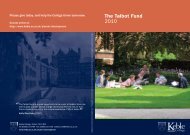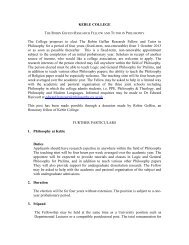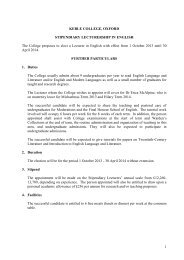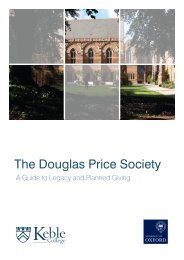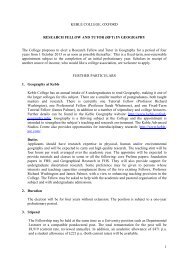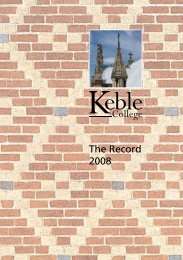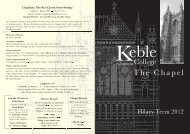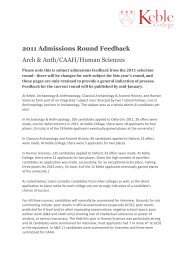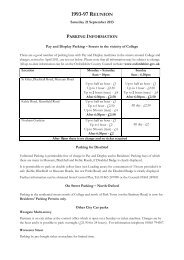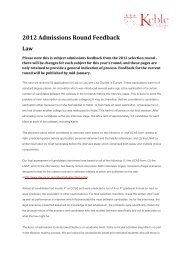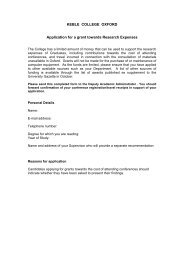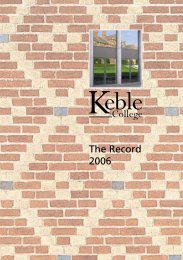The Record 2009 - Keble College - University of Oxford
The Record 2009 - Keble College - University of Oxford
The Record 2009 - Keble College - University of Oxford
Create successful ePaper yourself
Turn your PDF publications into a flip-book with our unique Google optimized e-Paper software.
<strong>The</strong> <strong>College</strong> at Large<br />
critical thinking and writing which were thrust upon me when I<br />
arrived in Leeds. I do not believe that I would have learned the<br />
necessary principles and practice from the narrow specialization<br />
<strong>of</strong> a doctoral programme; they were taught me — on the run, so<br />
to speak — by a slightly older colleague, the Coleridge scholar<br />
J P (Peter) Mann, to whom I owe many debts and with whom<br />
I remained on the closest terms <strong>of</strong> friendship until his death at<br />
the age <strong>of</strong> 78. I was six years in post before I published my first<br />
academic paper (on Ben Jonson’s Sejanus and Catiline), a length <strong>of</strong><br />
time that would not now be tolerated. I am here contending that<br />
this was a more testing apprenticeship than would have been<br />
provided by working on a doctorate, its topic creamed from the<br />
shallows <strong>of</strong> my twenty-one-year-young ignorance and vanity. I<br />
was well into my forties before I achieved a general breadth <strong>of</strong><br />
knowledge and a trained sensibility sufficient for undertaking<br />
scholarly and critical work with the necessary degree <strong>of</strong> depth<br />
and clarity.<br />
During my final period at Boston <strong>University</strong>, I co-founded,<br />
together with Pr<strong>of</strong>essor Sir Christopher Ricks, the Editorial<br />
Institute. Our chief motive stemmed from our reaction to that<br />
general tendency <strong>of</strong> graduate degrees in English and American<br />
Studies, to which I have already sketched my response. We<br />
shared the view (I believe) that in the past quarter <strong>of</strong> a century<br />
too much emphasis has been placed on theoretical methods <strong>of</strong><br />
approach, coupled — oxymoronically — with the cultivation <strong>of</strong><br />
a wild subjectivity <strong>of</strong> interpretative animus (by which I mean,<br />
to put it crudely, the exploitation <strong>of</strong> a perceived rectitude in the<br />
chosen author(s) for having anticipated the thesis-writer’s third<br />
remove weltanschauung or an attack on the author(s) for having<br />
failed to anticipate all that the student takes to be self-evidently<br />
‘relevant’).<br />
Christopher and I envisaged a programme (or program) in<br />
which graduate degree candidates would edit, with full textual<br />
and historical apparatus, a work chosen in consultation with<br />
the directors. My own emphasis was mainly on examples <strong>of</strong><br />
seventeenth-century philosophy and theology, though I also<br />
directed MA work in twentieth-century studies. It seemed to<br />
us that this period <strong>of</strong> graduate work should be an opportunity<br />
for students to establish a solid sense <strong>of</strong> period: a grasp <strong>of</strong> its<br />
politics, economics, philosophy, theology, technology, as well<br />
as <strong>of</strong> its own particular or peculiar literary conventions. This<br />
would be for many their first opportunity to acquire a grasp <strong>of</strong><br />
such essentials.<br />
47



